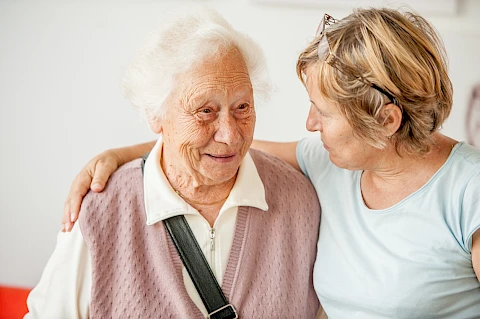
Alzheimer's Disease is a challenging condition that affects millions of seniors and their families. Caregivers are instrumental in managing daily care, providing emotional support, and navigating the complexities of the disease. World Alzheimer's Month is an opportunity to raise awareness and emphasize the importance of support for caregivers of seniors with Alzheimer's.
What Is Alzheimer's Disease?
A progressive brain disorder, Alzheimer's Disease affects memory, thinking skills, and the ability to perform simple tasks. The disease goes through several stages, from mild memory loss to severe cognitive impairment. Symptoms usually progress slowly but can have a significant impact on daily life. Besides affecting the quality of life of the person with Alzheimer's, it also poses emotional and physical challenges for caregivers.
Effective Communication Tips
Clear and compassionate communication can go a long way when interacting with seniors with Alzheimer's. Here are a few tips:
- Stay Calm and Patient: Seniors with Alzheimer's can sense frustration. Stay calm and patient so they will feel at ease.
- Simple Instructions: Break down tasks into simple steps. Use short sentences and avoid raising your voice.
- Non-Verbal Cues: Sometimes, a gentle touch or eye contact can speak volumes.
- Avoid Arguments: If they forget something, don't argue. Redirect the conversation or involve them in a different activity.
Handling challenging behaviors like agitation or aggression can be difficult. If they become upset, try to identify triggers and remove them, if possible. Distractions can also sometimes help.
Managing Daily Challenges
A structured day provides a sense of security and predictability for seniors with Alzheimer's. It can also reduce confusion and anxiety. Establish regular routines where possible. Consider installing grab bars and using bath chairs for bathing safety. Simplify dressing by laying out clothes in the order they are put on. During mealtimes, offer bite-sized, nutritious foods and limit distractions. Safety in the home is another critical aspect of caregiving. Enhance home safety by removing tripping hazards and installing locks where necessary.
Self-Care Strategies for Caregivers
Caring for a loved one with Alzheimer's can be demanding. It can even lead to caregiver burnout if you fail to consider your well-being. Take regular breaks to recharge your batteries. Share caregiving responsibilities with family members to lighten your load. Join a support group to connect with others facing similar challenges. Incorporate exercise and maintain a healthy diet to stay energized. Remember to balance caregiving with personal time. Ensure you engage in activities you enjoy, such as reading, pursuing hobbies, or taking walks.
Local Support Groups and Resources
Community and support networks can significantly ease the caregiving process. Support groups offer a space to share experiences, get advice, and find emotional support. Knowing you are not alone can make a big difference. Look into local organizations and online forums dedicated to Alzheimer's care. These resources can provide valuable information, connect you with others in similar situations, and offer practical tips to manage daily challenges.
Experience Top-Notch Alzheimer’s Care With Senior Helpers
Caring for a senior with Alzheimer’s can be challenging, but you don’t have to navigate the journey alone. Senior Helpers Canton-Rome-Cartersville provides quality in-home care for seniors living in the Canton, Cartersville, Rome, and Chatsworth areas. We’re also leading industry experts on Alzheimer’s and dementia care, and you can rely on us to help make the journey easier for you and your senior loved one. Contact us today for more information!